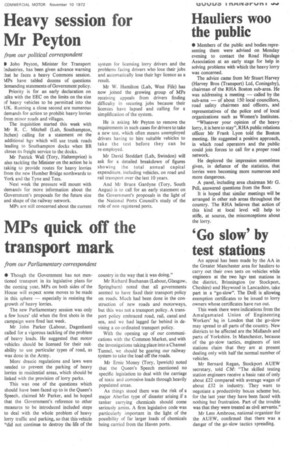MPs quick off the transport mark
Page 35

If you've noticed an error in this article please click here to report it so we can fix it.
from our Parliamentary correspondent
• Though the Government has not mentioned transport in its legislative plans for the coming year, MPs on both sides of the House will expect some moves to be made in this sphere especially in resisting the growth of heavy lorries.
The new Parliamentary session was only a few hours' old when the first shots in the campaign were fired last week.
Mr John Parker (Labour, Dagenham) called for a vigorous tackling of the problem of heavy loads. He suggested that motor vehicles should be licensed for their suitability to use particular types of road, as was done in the Army.
More drastic regulations and laws were needed to prevent the parking of heavy lorries in residential areas, which should be linked with the provision of lorry parks.
This was one of the questions which should have been faced up to in the Queen's Speech, claimed Mr Parker, and he hoped that the Government's reference to other measures to be introduced included steps to deal with the whole problem of heavy lorry traffic and parking, so that this vehicle "did not continue to destroy the life of the country in the way that it was doing."
Mr Richard Buchanan (Labour, Glasgow, Springhurn) noted that all governments seemed to have fixed their transport policy on roads. Much had been done in the construction of new roads and motorways, but this was not a transport policy. A transport policy embraced road, rail, canal and sea, and we had lagged far behind in devising a co-ordinated transport policy.
With the opening up of our communications with the Common Market, and with the investigations taking place into a Channel Tunnel, we should be gearing our railway system to take the load off the roads.
Mr Ernie Money (Tory, Ipswich) noted that the Queen's Speech mentioned no specific legislation to deal with the carriage of toxic and corrosive loads through heavily populated areas.
As things stood there was the risk of a major Aberfan type of disaster arising if a tanker carrying chemicals should come seriously amiss. A firm legislative code was particularly important in the light of the possibility of far larger loads of chemicals being carried from the Haven ports.




































































































































